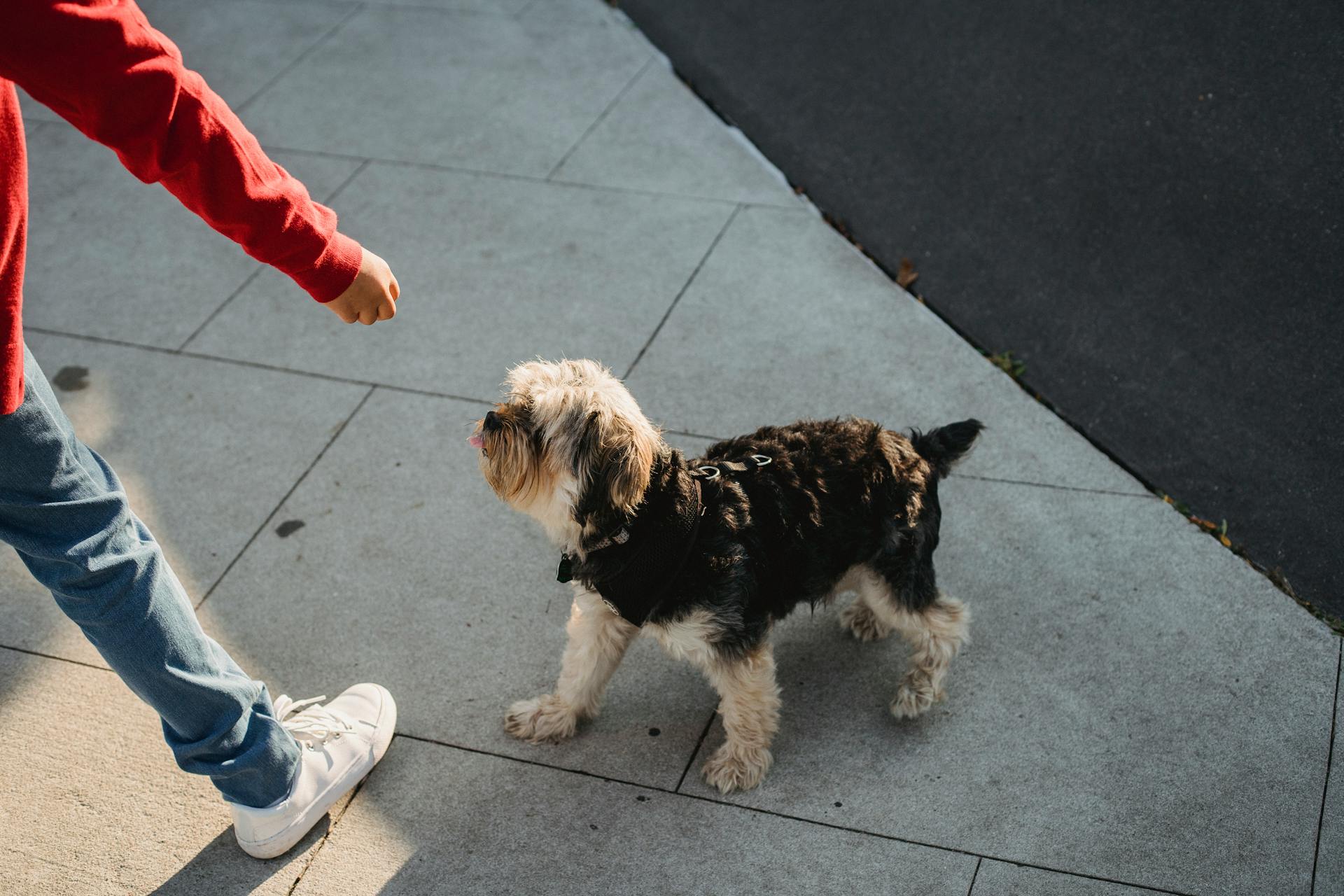
Yorkshire Terriers are prone to allergies, with a study showing that up to 10% of the breed suffers from food allergies.
Their small size and delicate skin make them more susceptible to skin allergies, which can cause itching, scratching, and skin infections.
Regular grooming is essential to prevent skin allergies, as dirt and bacteria can easily accumulate on their skin.
Daily brushing and bathing can help reduce the risk of skin allergies in Yorkies.
Some common allergens that can trigger skin allergies in Yorkies include pollen, dust mites, and certain foods like beef and dairy products.
In addition to skin allergies, Yorkies can also be prone to food allergies, which can cause digestive issues and skin problems.
A balanced diet with limited ingredients can help reduce the risk of food allergies in Yorkies.
Consulting with a veterinarian to determine the best diet for your Yorkie is crucial in preventing food allergies.
Check this out: What Do Yorkshire Terriers Eat
Yorkshire Terrier and Allergies
Yorkshire Terriers are a popular choice for people with allergies, but it's essential to understand their potential impact on your health.
Yorkies can be susceptible to a variety of allergens that manifest as skin irritations, including dust, mold, pollen, laundry detergents, and household cleaners. These allergens can cause redness, bumps, cracks, rough patches, or swelling on their skin.
Fleas are a common skin allergen for Yorkies, and even a single flea bite can trigger an adverse reaction. Fleas can jump 6-feet, so it's possible for your home to be clean, but your Yorkie can still pick up fleas from other dogs.
Yorkies are also prone to skin allergies due to their sensitive skin and the development of new allergies as they age. Their long coat, especially if not properly cared for, can trap allergens and reduce airflow to the skin.
To alleviate dog allergies at home, you can filter the air, remove carpeting, and clean floors and surfaces regularly. Bathing and grooming your Yorkie regularly can also help minimize dander and reduce exposure to allergens.
Some owners choose a shorter grooming style for their Yorkies to improve skin health and reduce the risk of skin allergies. However, even with proper grooming, Yorkies can still cause allergic reactions in some people.
You might like: Yorkie vs Yorkshire Terrier
If you're allergic to dogs and considering bringing home a Yorkshire Terrier, do a test run first to ensure you can live allergy-free with a Yorkie. Spend time in a friend's home with a Yorkie, volunteer to pet sit, or foster a Yorkie from a breed rescue organization to see if you react to their presence.
Here are some common signs of a skin allergy in Yorkies:
• Redness
• Bumps
• Cracks
• Rough patches
• Swelling
• Upset stomach
• Nasal and eye congestion
Keep in mind that while Yorkies are considered hypoallergenic, they're not 100% hypoallergenic dogs. People with severe allergies can still react to their presence.
On a similar theme: Are Yorkshire Terriers Good Dogs
Treatment and Prevention
Preventing skin allergies in your Yorkie is crucial, and regular brushing is a great place to start. This allows you to examine the skin for abnormalities and fleas, and also reduces the amount of loose hair and allergens.
Using hypo-allergenic detergents, house cleaners, and grooming products can also help prevent your Yorkie from triggering allergens. Additionally, providing them with filtered water instead of tap water can greatly benefit their health.
Check this out: Yorkshire Terrier Yorkie Adoption
Identifying the allergen is another great way to prevent exposure. You can do this through canine skin and blood allergy testing, or an elimination diet recommended by your vet. This involves feeding your Yorkie a bland hypoallergenic diet for at least 8 weeks, then reintroducing foods one by one to see if any cause an allergic reaction.
Here are some common allergens to look out for:
If your Yorkie does develop skin allergies, don't worry – there are many treatment options available. Your vet may prescribe antihistamines and corticosteroids to reduce inflammation and itchiness, or recommend topical sprays like cyclosporine for fast relief.
Allergy Locations
Yorkies are prone to skin allergies that can occur anywhere on their body, so it's essential to frequently examine them to catch any issues early on.
Common sites of atopic dermatitis include around the ears, eyes, and nose, and on the joints, paws, and belly.
Healthy skin of a Yorkshire terrier is relatively smooth to the touch, and is white with a subtle pink hue to it.
Redness, bumps, cracks, rough patches, or swelling could be a sign of a skin allergy, so keep an eye out for these changes.
Parallel symptoms often occur when allergies cause skin irritation, including upset stomach and nasal and eye congestion.
For another approach, see: Yorkshire Terrier Skin Bumps
Treatment Options
Prevention is key when it comes to treating your Yorkie's skin allergies. Regular brushing, particularly if the coat is long, is critical and provides an opportunity to examine the skin of your Yorkie and look for abnormalities and fleas.
Flea prevention tactics are a requirement for any Yorkie owner, such as monthly topical or oral treatments. Using hypo-allergenic detergents, house cleaners, and grooming products can also help prevent your Yorkie from triggering allergens.
Providing your Yorkie with filtered water, as opposed to tap water, is simple and could benefit their health greatly. Identifying the allergen can be another great way to subsequently prevent exposure to it, which can be detected through canine skin and blood allergy testing.
An elimination diet may also be recommended by your vet, where your Yorkie would be placed on a bland hypoallergenic diet for at least 8 weeks, and then foods would be reintroduced one by one to see if any adverse reactions occur.

Here are some common skin conditions and dietary adjustments that can help alleviate them:
If your Yorkie does develop skin allergies, veterinarians can prescribe a variety of medications, such as antihistamines and corticosteroids to reduce inflammation and itchiness. Topical sprays, like cyclosporine, may also be recommended for widespread irritation.
Hypoallergenic Considerations
Yorkshire terriers are considered hypoallergenic dogs, but what does that really mean? It means they have non-shedding or low-shedding coats that produce less dander, a trigger for allergies in some people.
The term "hypoallergenic" doesn't mean a dog is completely allergen-free, but rather less likely to stimulate allergies. In fact, no dog breed is 100% hypoallergenic or allergen-free.
Yorkies have a unique coat that makes them virtually non-shedding, ranking their shedding as a one on a scale of one to five. This makes them a good choice for people affected by pet allergies.
Some people can be allergic to a specific dog and not all dogs of that breed. For example, a person could react to one Maltese and live allergy-free with another.
Readers also liked: How to Draw a Yorkshire Terrier Dog
If you're allergic to dogs and considering bringing home a Yorkshire terrier, it's essential to do a test run first to ensure you can live allergy-free with a Yorkie. Spend time in a Yorkie's home, pet sit, or foster a Yorkie to see how you react.
A responsible breeder will let you visit their dogs in their home, giving you time to play with and interact with the dogs before you bring one home. Pay attention to how you feel throughout any visits and make note of any allergy symptoms you experience.
To minimize allergy symptoms, consider using an air purifier and a robot vacuum in your home. You can also use conditioner and fish oil supplements for your dog's coat to promote a healthy, shiny coat.
Yorkshire Terrier Health
Yorkshire Terrier Health is a top priority for any Yorkie owner. Yorkies are generally pretty healthy pups and live long lives.
But, like all dogs, they can be prone to certain health issues. The top five health issues for Yorkies are an upset stomach, allergies, skin irritation, ear infections, and diarrhea. These issues can be managed with regular veterinary check-ups and a healthy lifestyle.
Some other health conditions that can affect Yorkies include Patellar Luxation, where the knee cap dislocates itself, and Progressive Retinal Atrophy, a group of genetic eye conditions that cause progressive vision loss.
For your interest: Yorkshire Terrier Common Health Problems
Yorkie Health Facts
Yorkies are generally pretty healthy dogs, but like any breed, they can be prone to certain health issues. One of the top five health issues for Yorkies is an upset stomach.
Yorkies are also known to have higher instances of allergies. Allergies can cause a range of symptoms, from mild itching to life-threatening anaphylaxis. If you notice your Yorkie scratching or chewing at their skin, it's a good idea to take them to the vet.
Patellar Luxation is a condition common in small and miniature breeds, where the knee cap dislocates itself. This can be painful for your Yorkie and may require surgery.
Progressive Retinal Atrophy is a group of genetic eye conditions that cause progressive vision loss. This can make it difficult for your Yorkie to navigate their surroundings.
Here are some common health issues that can affect Yorkies:
- Patellar Luxation: A condition common in small and miniature breeds where the knee cap dislocates itself.
- Progressive Retinal Atrophy: A group of genetic eye conditions that cause progressive vision loss.
- Portosystemic Shunt: Also known as a liver shunt, this is a bypass of the liver by the circulatory system.
- Hypoglycemia: Commonly known as low blood sugar, this occurs when glucose levels in the bloodstream are below average.
Regular check-ups with your veterinarian are crucial to catching any potential health issues early on.
Benefits of Fresh Food
Fresh food can offer clarity in ingredient content, allowing you to make discriminatory actions against triggering ingredients.
Pet food production and labels aren’t well regulated, so many commercial dog foods are plagued with contamination and additives.
Avoiding problematic ingredients is paramount to your yorkie's health if they have an identified food sensitivity.
True food allergies in dogs are uncommon, but yorkies can still be sensitive to various foods that manifest as skin reactions.
If your yorkie is sensitive to food additives, consuming quality fresh food eliminates this risk.
See what others are reading: Yorkshire Terrier Foods to Avoid
Allergy Relief and Management
If you're allergic to dogs but still want a furry friend, Yorkies might be a good option. They have a silky coat that barely sheds, making them a good choice for people with mild allergies.
Yorkies are not 100% hypoallergenic, but they're one of the best breeds for allergy sufferers. According to the American Kennel Club (AKC), they're included on their list of hypoallergenic dog breeds.
Broaden your view: Are Yorkies Hypoallergenic Dogs
To minimize dander and reduce exposure to allergens, consider filtering the air at home and removing carpeting. You should also clean floors and surfaces regularly.
Bathing and grooming your Yorkie regularly can also help reduce allergens. Their coat's specific needs will determine how often they need to be bathed and groomed.
If you're considering bringing a Yorkie home, spend some time with them first to see if you react to them. This is especially important if you have severe allergies.
To help manage your Yorkie's health, keep an eye out for common issues like an upset stomach, allergies, skin irritation, ear infections, and diarrhea. Regular check-ups with your veterinarian will help keep your Yorkie healthy.
Here's a quick rundown of some common health issues in Yorkies:
- Upset stomach
- Allergies
- Skin irritation
- Ear infections
- Diarrhea
Sources
- https://www.nomnomnow.com/learn/article/yorkshire-terriers-skin-allergies
- https://www.thesprucepets.com/hypoallergenic-dog-breeds-5181208
- https://www.pumpkin.care/blog/best-hypoallergenic-dogs/
- https://www.aspcapetinsurance.com/resources/yorkshire-terriers/
- https://nativepet.com/blogs/health/are-yorkies-hypoallergenic
Featured Images: pexels.com


